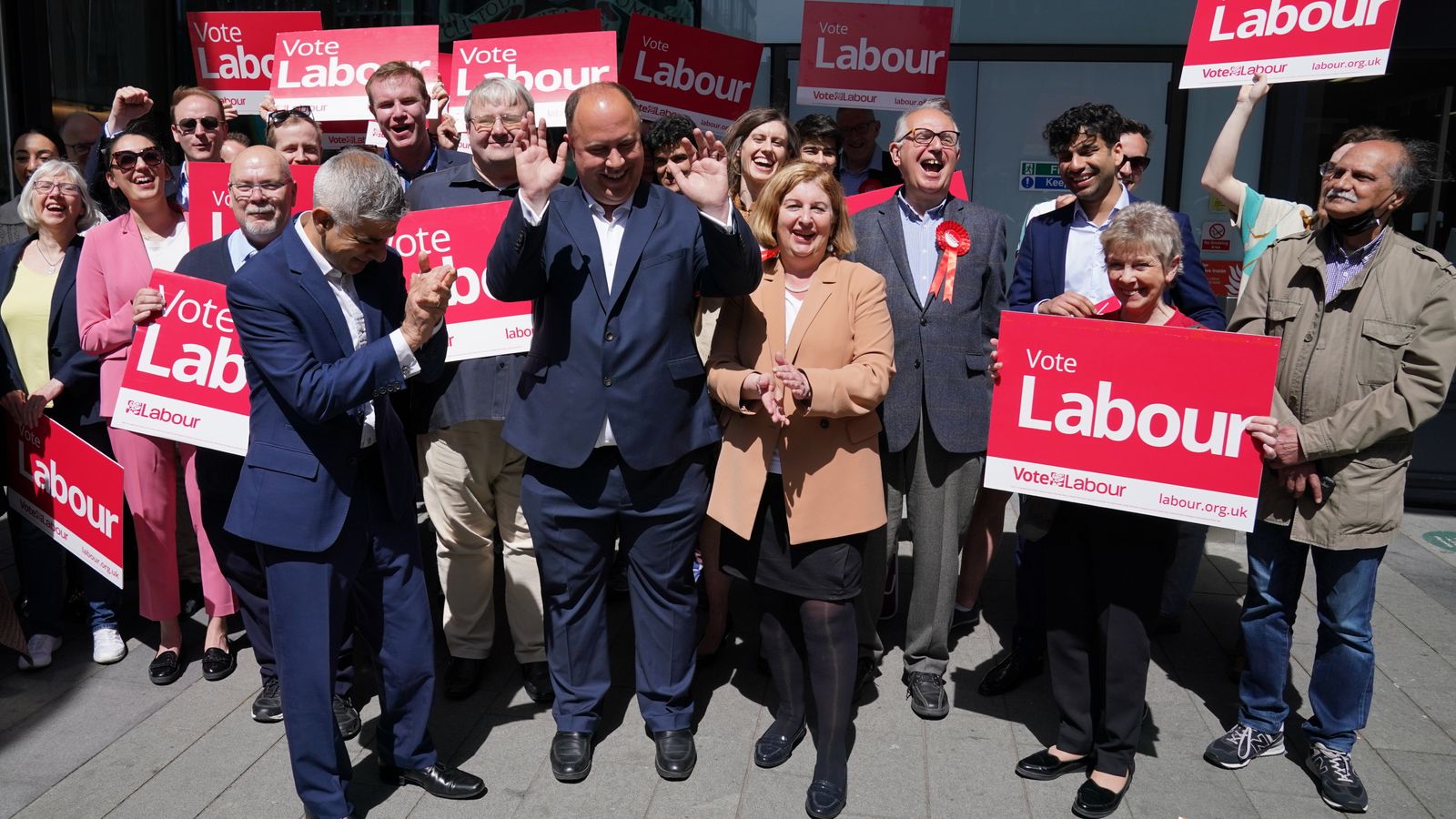Boris Johnson has admitted it was a “tough night” for the Conservatives after the party lost some key local councils in London to Labour – but the opposition party had mixed results outside the capital.
The prime minister said: “We’ve had a tough night in some parts of the country, but on the other hand, in other parts of the country, you’re still seeing Conservatives going forward and making quite remarkable gains.”
He said the local election results were “certainly mixed” after the Tories lost Wandsworth, Margaret Thatcher’s “favourite council”, Westminster and Barnet to Labour.
However, Labour gains in the rest of England were more modest.
Local elections live: Lib Dem gains could spook Tory MPs weighing up PM’s future
That did not stop local Conservative leaders from blaming the prime minister for shock losses as partygate and the cost of living dominated comments at the doorstep.
And a southern Tory MP told Sky News: “It’s pretty grim. The PM is to blame no one else and there are now 19 Tory London MPs who will be baying for blood. The PM is killing our traditional vote.”
Local elections 2022: Signs of a Lib Dem revival may worry Tory MPs more than Labour’s gains in London
Local elections 2022: Voting signals threat to Tory majority but Labour a long way short of seizing power
Local elections 2022: Wandsworth – jewel in Tory crown – snatched by Labour after more than four decades
But Mr Johnson’s allies warned it was not time to change the leader as they insisted Labour gains fell short of what was needed for the party to secure a general election victory.
Check the result where you live
Outside London, Labour was triumphant in the new Cumberland unitary council, which covers Tory-held seats, and took the bellwether council of Southampton from the Tories.
But in high profile places where Labour needed to make advances – such as Hartlepool, Peterborough, Redditch and Ipswich – the party failed to take those councils.
Maidstone, whose MP is Conservative, saw Labour and Green pick up one seat each to pull the Tory-run council into no overall control.
While the Conservatives have seen a substantial drop in support in the south of England, Labour has seen a larger drop in the north.
A rise in Lib Dem support across England has seen the party winning Hull from Labour, gaining from the Tories in Merton and in West Oxfordshire where David Cameron’s constituency was.
Please use Chrome browser for a more accessible video player
Sir Keir Starmer, speaking from Barnet on Friday morning, remained defiant as he said the results represented a “massive turning point for the Labour Party”.
“From the depths in 2019 we are back on track now for the general election, showing what the change that we’ve done, the hard change that we’ve done in the last two years, what a difference it has made,” he added.
Labour sources described the victory in Wandsworth, known for its low taxes, as “monumental”.
“This was the Tories’ jewel in the crown,” one party source said. “Voters in Wandsworth have put their trust in the change Keir Starmer’s Labour represents.”
Please use Chrome browser for a more accessible video player
Lib Dems hail ‘real trend’ gains
Lib Dem leader Sir Ed Davey was grinning about his party’s gains as he spoke to Sky News’ Kay Burley, telling her people had used their votes to send a message to Mr Johnson.
He insisted Lib Dem gains were not protest votes against the government but “a real trend now” – partly because the Tories are “failing so badly”.
However, Conservative Party co-chair Oliver Dowden brushed off Tory losses as he told Sky News the results were “more consistent with what you would expect in midterm in urban areas” – but admitted he was “disappointed” with the key losses in London.
“Labour is certainly not on the path to power and I believe Boris Johnson has the leadership skills, particularly the energy and dynamism to lead us into the next election,” he added.
Graphic below shows overall picture in England
PM under pressure in London
The Tories had run Westminster since its creation in 1964 and Wandsworth since it turned blue in 1978, shortly before Mrs Thatcher’s election as prime minister.
Victory in Barnet will also be seen as a significant accomplishment for Sir Keir and a potential sign of growing trust in the party’s leadership.
The north London authority has one of the UK’s biggest Jewish populations, and as Labour was dogged by accusations of antisemitism under former leader Jeremy Corbyn, people in the area voting for the party decreased.
Please use Chrome browser for a more accessible video player
Read more:
From the red wall to Brexit: The story of the local elections 2022 so far in charts
A local Tory leader said the Labour victory in Barnet “does not bode well” for the Conservatives for a general election.
Daniel Thomas said: “I think this is a warning shot from Conservative supporters… but also a fair number of Conservative voters who just didn’t go out to vote, stayed at home.”
Deputy political editor
This is not an easy election to analyse: the picture is mixed and messy. As dawn breaks on Friday, nobody – perhaps with the exception of the Lib Dems – should be overly happy with the results.
Tories suffered losses – perhaps not as many as they might. Two losing council leaders, one in the North West, one in London, put some of the blame at the door of Boris Johnson.
Labour is continuing to improve in London, taking Wandsworth, Barnet and Westminster. There were bright spots for Labour at either end of the country – the new Cumberland unitary council – a symbolic reclaiming of “Workington man”, which covers seats held by Tories, and Labour-Tory bellwether of Southampton.
Lib Dems take Hull from Labour
Labour will be pleased to have gained Southampton from the Tories, overturning the small majority Mr Johnson’s party had there from the last set of local elections.
Sir Keir’s party also gained the new Cumberland authority, a significant win given the area has three Conservative MPs in Carlisle, Copeland and Workington.
But the Liberal Democrats took Kingston-upon-Hull in what will be seen as a big defeat for Labour.
Many of the so-called red wall councils are yet to declare.
Please use Chrome browser for a more accessible video player
While the Conservatives held Basildon, elsewhere in Essex, the Tory leader of Colchester Council lost his seat to the Liberal Democrats.
Mr Johnson’s party also failed to take control of Peterborough, where the Conservatives needed to gain two seats, with the party now running the council under minority control.
John Mallinson, the Tory leader of Carlisle City Council, said the prime minister should be moved on after his party suffered a mass defeat in one local election.
Please use Chrome browser for a more accessible video player
Local, national and mayoral elections
In England, there are more than 4,000 seats up for grabs, while Scotland and Wales each have more than 1,000 seats at stake.
The elections decide who will be responsible for handling local issues such as planning, housing and rubbish collections – but wider national issues such as the surge in the cost of living have also come to the fore.
Results, which started arriving in the early hours of Friday, could also prove key to the future of the prime minister – and whether rumblings of backbench discontent escalate into a chorus of opposition triggering a no-confidence vote.
They will also shed light on whether Sir Keir has been able to make ground amid the pressures facing the PM as a result of partygate, the cost of living crisis and questions about the culture in Westminster.
Please use Chrome browser for a more accessible video player
In Northern Ireland, 90 assembly members are being elected – with tensions high as polls point to Sinn Fein overtaking the DUP as the largest party, suggesting Northern Ireland could have a nationalist first minister for the first time.
Mayoral votes also took place – in South Yorkshire, Croydon, Hackney, Lewisham, Newham, Tower Hamlets and Watford.
Voters in Bristol chose to scrap the directly elected mayor system in the city in a referendum.
In Scotland and Wales, counting did not start until Friday morning, with the earliest results not expected until the afternoon.






















